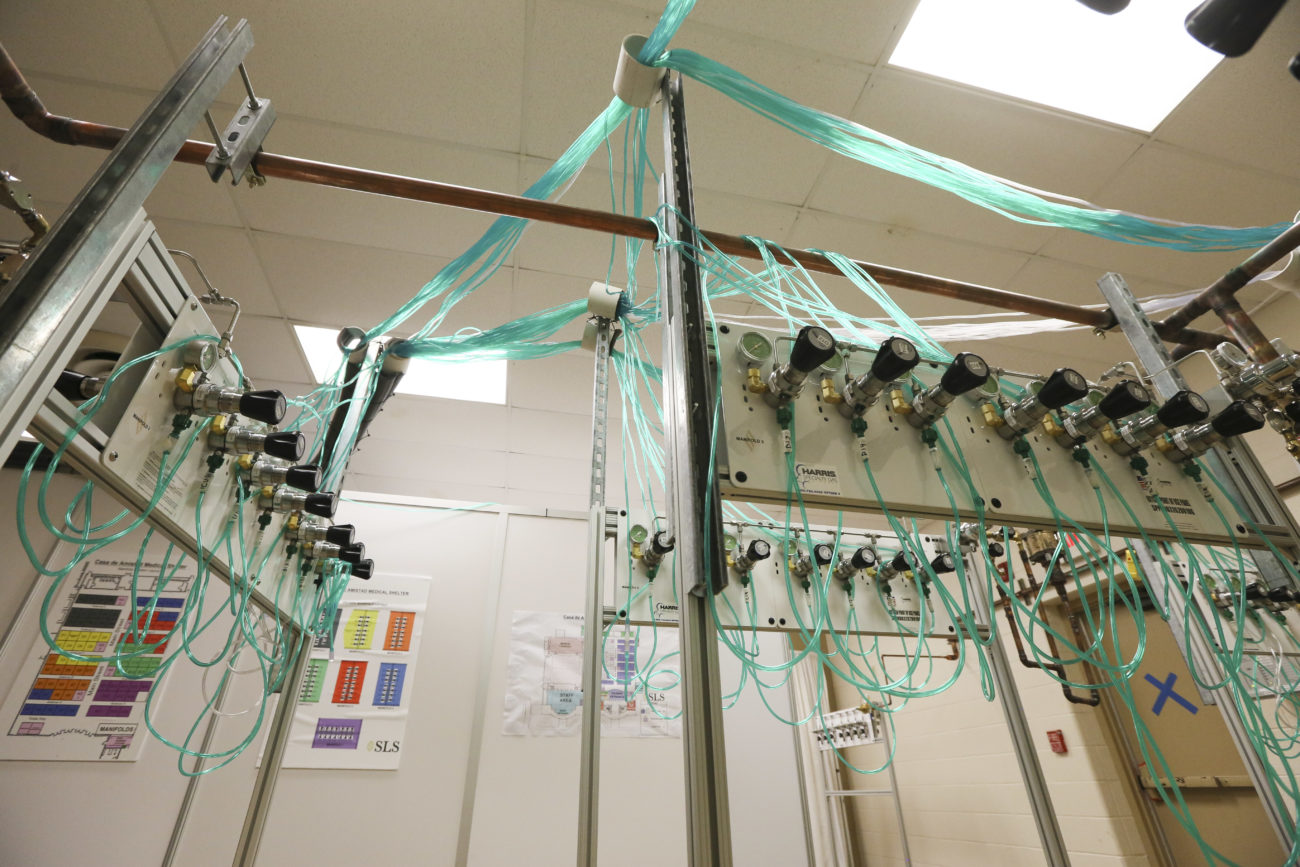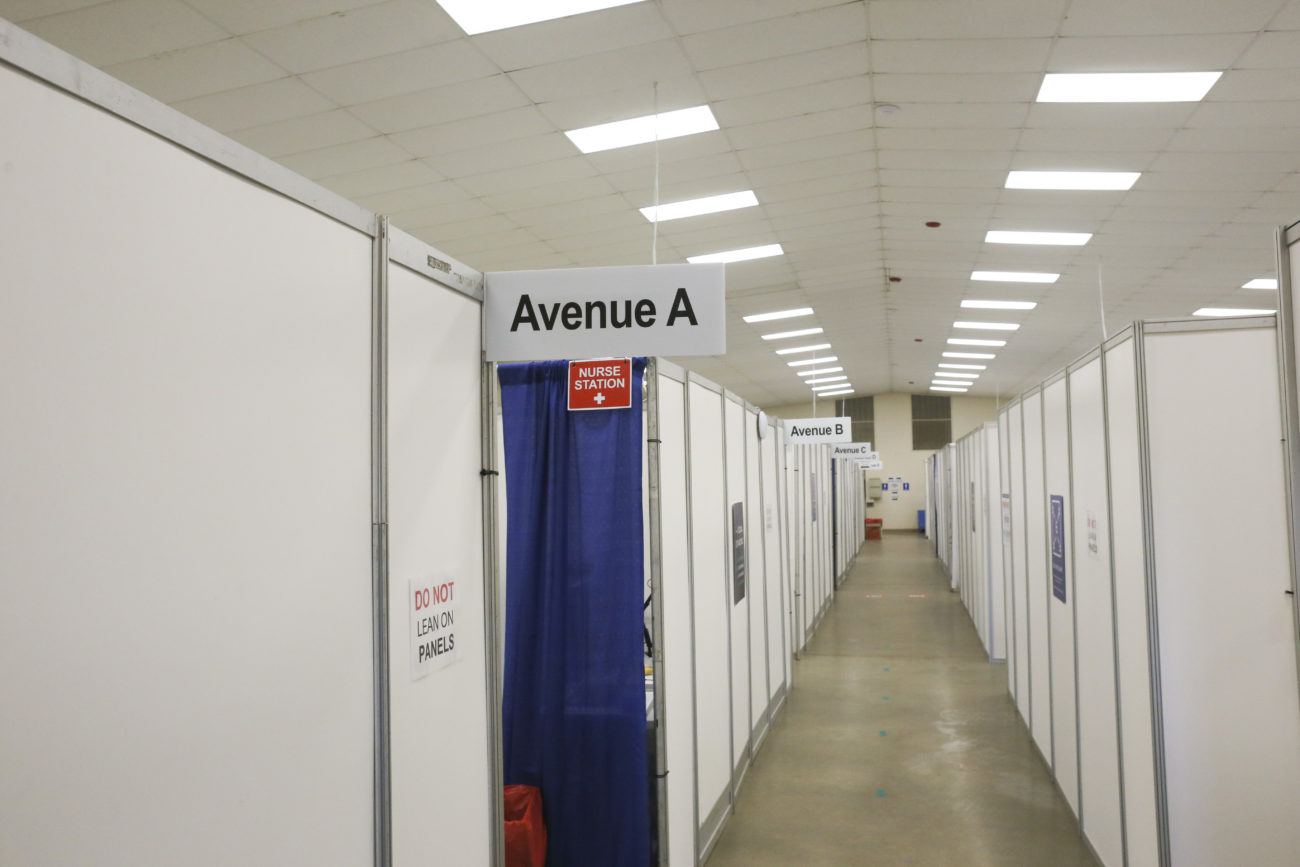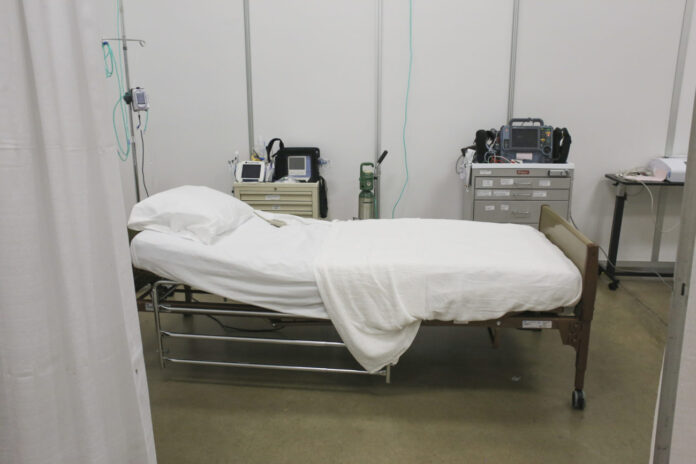HARLINGEN — Last month, the Rio Grande Valley’s high rate of COVID-19 hospitalizations
led state officials to build Texas’ largest recovery centers at Casa de Amistad and the McAllen Convention Center as part of a plan to free beds in hospitals spilling over capacity.
After about three weeks, Valley Baptist Medical Center late Friday afternoon transferred the first patient to Harlingen’s 13,000-square-foot convention hall, renovated to treat as many as 96 patients.
Paperwork had led to the delay in opening the recovery center funded through the Coronavirus Aid Relief and Economic Security Act, or CARES.
Officials finalized the center’s hospital licensing requirements Wednesday, Josh Ramirez, Harlingen’s public health director, said.
“The necessary paperwork and contracts have been signed so they are coordinating with our area hospitals for patient transfers,” County Judge Eddie Treviño Jr. said during a press conference Friday.
Inside the recovery center, a medical team has been waiting for Cameron County hospitals to transfer patients.
The center’s three eight-hour shifts have been expected to be made up of a 125-member staff including specialized doctors, nurses and respiratory therapists, Harlingen spokeswoman Irma Garza stated earlier this month.
For the project, the state contracted SLS, a Galveston-based company that converted New York City’s Billie Jean King Tennis Center and the Brooklyn Cruise Terminal into COVID-19 field hospitals earlier this year.
McAllen Convention Center
Meanwhile, as of last Tuesday Hidalgo County hospitals had transferred eight patients to the McAllen recovery center, renovated to treat as many as 250 patients.
On Friday, the state’s Austin-based emergency management officials didn’t respond to requests for updated patient numbers at the McAllen treatment center.
“We did our job in providing the help and services they needed,” Ramirez said as he waited for hospitals to transfer patients to the Harlingen recovery center.

Treviño said the recovery center includes 25 low-acuity care beds and 25 medium-acuity care beds.
“It has the capacity to go up to 100,” he said. “I hope we don’t have to utilize that.”
Ramirez said hospitals are planning to slowly transfer patients to the recovery center.
“The plan is to do it gradually — it’s not going to be 20 or 50 all at once,” he said. “It will be in small increments of one or two patients at a time.”
Hospitalizations dropping
Since June, the Valley’s hospitals have struggled with a surge of COVID-19 patients amid a dramatic increase in new cases.
Soon, the hospitals were grappling with Texas’ highest hospitalization rates.
By late July, the hospitals reached peak hospitalization rates amid a surge of COVID-19 cases in the region lacking medical resources to care for a population suffering underlying medical complications stemming from some of the nation’s highest rates of obesity, diabetes and hypertension.
On July 22, the Valley’s hospitals peaked with 1,606 hospitalizations while the state’s total number of hospitalizations reached 10,893.
Then late last month, Gov. Greg Abbott announced plans to use CARES Act
funding to convert Casa de Amistad and the McAllen Convention Center into the state’s largest COVID-19 recovery centers.
Now, hospitalizations are dropping.

On Tuesday, the Valley’s number of hospitalizations had dropped to 1,093 while Texas’ total numbers fell to 7,216.
Meanwhile, at Valley Baptist Medical Center 84 COVID-19 patients filled hospital beds while the ICU held 42 patients and 21 patients awaited test results.
With COVID-19 hospitalizations dropping, the Valley’s hospitals aren’t struggling with patient numbers pushing them over capacity.
“They have dropped but there are still a lot,” Ramirez said of hospitals’ patient loads.
Hospitals monitoring surge
At Valley Baptist Health System, officials continue to monitor the patient surge.
“The healthcare needs of our community have fluctuated as we continue to address the ongoing surge of COVID-19 patients in our region,” hospital officials stated. “Valley Baptist Health System continues to diligently monitor the situation and our hospitals are utilizing all available resources available to help manage this crisis.”

“We appreciate the work of all local officials and the state’s continued efforts to support our region’s healthcare providers in our collaborative fight against the virus. This alternative care site will offer our hospitals some relief as we continue to provide all necessary healthcare services to our communities, to include both COVID and non-COVID care.”
During a press conference Tuesday, a reporter told U.S. Sen. John Cornyn, Texas’ Republican senior senator, hospitals had transferred few patients to the McAllen recovery center.
“The big concern was we were overwhelming the hospitals,” Cornyn told reporters. “The fact that they are not widely needed is good but they’re there in case they are needed.”




